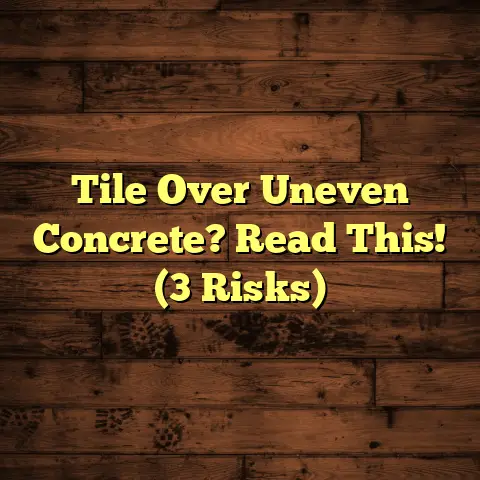How To Clean A Nature Stone Floor? (5 Sec Fix!)
Imagine walking into your home.
You’re greeted by the stunning beauty of your nature stone floor.
But wait!
Instead of elegance, you see dirt, grime, and stains diminishing its natural charm.
The challenge is clear, isn’t it?
How do you restore your floor’s pristine condition without endless scrubbing?
Or using harsh chemicals that could cause damage?
I’m here to tell you it’s possible, and it doesn’t have to take forever.
In this article, I’ll unveil secrets to efficiently clean your nature stone floor.
I’ll give you a practical solution that takes just seconds to implement.
Yes, you read that right – seconds!
It’s a game changer for busy homeowners.
Section 1: Understanding Nature Stone Flooring
So, what exactly is nature stone flooring?
Well, it’s a broad term encompassing various types of natural stone used for flooring.
Think marble, granite, slate, limestone, travertine, and even sandstone.
Each has its unique characteristics and beauty.
- Marble: Known for its luxurious appearance
and intricate veining. - Granite: A tough, durable option that resists
stains and scratches. - Slate: Offers a rustic, textured look and
is naturally slip-resistant. - Limestone: A softer, more porous stone
with a warm, earthy feel.
Benefits of Nature Stone Flooring
Why do people choose nature stone?
Let me tell you, the benefits are numerous.
- Aesthetics: Unmatched natural beauty that
adds elegance and sophistication to any space. - Durability: With proper care, nature stone
can last for decades, even centuries! - Natural Beauty: Each stone is unique,
offering variations in color and pattern. - Increased Home Value: Nature stone flooring
is a desirable feature that can boost your
home’s market value.
Common Issues with Nature Stone Floors
Of course, like any flooring, nature stone is prone to certain issues.
- Staining: Porous stones like marble and
limestone can easily stain if spills aren’t
cleaned up quickly. - Scratching: While durable, some stones
can scratch from abrasive materials or heavy
furniture. - Dullness: Over time, the surface can lose
its shine due to wear and improper cleaning. - Etching: Acidic substances like lemon juice
or vinegar can etch the surface, leaving
permanent marks.
Section 2: Assessing Your Nature Stone Floor Condition
Okay, let’s get down to business.
How do you know what your floor really needs?
Start by taking a good, hard look at your floor.
- Dirt and Grime: Is there a visible layer of
dirt or buildup, especially in grout lines? - Stains: Can you identify specific stains from
food, drinks, or other sources? - Scratches: Are there noticeable scratches,
especially in high-traffic areas? - Dullness: Does the floor lack its original
shine and luster? - Etching: Look for dull spots or marks that
appear lighter than the surrounding area.
Cleaning vs. Maintenance vs. Repair
It’s important to distinguish between cleaning, maintenance, and repair.
- Cleaning: Removes surface dirt, grime,
and minor stains. - Maintenance: Includes regular upkeep like
dusting, sweeping, and occasional polishing
to prevent damage and maintain the floor’s
appearance. - Repair: Addresses more serious issues like
cracks, chips, or significant staining that
require professional attention.
The Importance of Regular Upkeep
Trust me on this one: regular upkeep is key.
Preventative maintenance is far easier (and cheaper!) than dealing with major problems down the road.
Regular sweeping and mopping can prevent dirt and grit from scratching the surface.
Promptly cleaning spills can prevent stubborn stains.
Section 3: The 5-Second Fix: Quick Cleaning Solution
Alright, are you ready for the magic trick?
This quick cleaning solution is perfect for those days when you just need a fast refresh.
Necessary Materials and Tools
Here’s what you’ll need:
- pH-Neutral Cleaner: This is crucial!
Acidic or alkaline cleaners can damage
nature stone.
I recommend something like
StoneTech Revitalizer. - Spray Bottle: For easy application.
- Microfiber Mop or Soft Cloth: To wipe
the floor.
Step-by-Step Guide
- Spray: Lightly spray the pH-neutral
cleaner onto the affected area. - Wipe: Immediately wipe the area with
a microfiber mop or soft cloth. - Dry: Ensure the area is dry to prevent
water spots.
That’s it! Seriously, that’s all there is to it.
This quick fix is perfect for spot cleaning and maintaining a generally clean floor.
Section 4: Deep Cleaning Your Nature Stone Floor
Sometimes, the 5-second fix just isn’t enough.
When dirt and grime have built up over time, or when you’re dealing with stubborn stains, it’s time for a deep clean.
Choosing the Right Cleaning Products
Again, I can’t stress this enough: always use pH-neutral cleaners.
Avoid anything acidic (like vinegar or lemon juice) or alkaline (like bleach or ammonia).
For specific stone types, you might consider specialized cleaners.
For example, marble cleaners are formulated to protect the stone’s delicate surface.
Techniques for Removing Tough Stains and Grime
- Poultices: For deep-set stains, a poultice
can draw out the stain.
Mix a absorbent
material (like baking soda or diatomaceous
earth) with a cleaning solution to form a
paste.
Apply it to the stain, cover with
plastic wrap, and let it sit for 24-48 hours. - Gentle Scrubbing: Use a soft-bristled brush
or sponge to gently scrub away stubborn grime.
Avoid abrasive scrubbers, which can scratch
the surface. - Steam Cleaning: A steam cleaner can be
effective for loosening dirt and grime without
the use of harsh chemicals.
Just be sure to
use the appropriate setting for your stone type.
Recommended Tools for Deep Cleaning
- Steam Cleaner: As mentioned above, a great
option for loosening dirt and grime. - Soft-Bristled Scrub Brushes: For gentle
scrubbing without scratching. - Microfiber Mops and Cloths: Essential for
wiping and drying the floor. - Wet/Dry Vacuum: For removing excess water
after cleaning.
Rinsing and Drying
Rinsing and drying are crucial steps.
After cleaning, thoroughly rinse the floor with clean water to remove any cleaner residue.
Use a wet/dry vacuum or microfiber mop to remove excess water.
Allow the floor to air dry completely.
Section 5: Preventative Maintenance Tips
Okay, let’s talk about keeping your nature stone floor looking its best for years to come.
Regular Maintenance Routines
- Sweep or Dust Mop Daily: Remove loose dirt
and debris to prevent scratching. - Mop Weekly: Use a pH-neutral cleaner and
a microfiber mop to clean the floor. - Clean Spills Immediately: Don’t let spills
sit and stain the surface. - Use Doormats and Rugs: Place mats at
entrances to trap dirt and debris. - Use Furniture Pads: Protect the floor from
scratches caused by furniture legs.
The Significance of Sealing
Sealing is essential for protecting porous stones like marble and limestone.
A sealant creates a barrier that prevents liquids from penetrating the surface and causing stains.
How often should you seal?
It depends on the type of stone and the sealant used.
Generally, I recommend sealing every 1-3 years.
Section 6: Troubleshooting Common Problems
Even with the best care, problems can arise.
Let’s tackle some common issues.
Common Cleaning Mistakes
- Using Acidic or Alkaline Cleaners: As I’ve
said repeatedly, avoid these! - Using Abrasive Scrubbers: Can scratch
the surface. - Over-Wetting the Floor: Can lead to water
damage and discoloration. - Not Rinsing Properly: Leaves cleaner
residue that can dull the surface.
Solutions for Specific Issues
- Water Stains: Try a poultice of baking
soda and water. - Etching: Minor etching can sometimes be
polished out by a professional.
Severe etching
may require repair. - Discoloration: Identify the cause of the
discoloration and use an appropriate cleaner
or poultice. - Dullness: Polishing can restore the shine
to dull stone floors.
How to Restore Shine
- Polishing Compounds: Use a polishing
compound specifically designed for nature stone. - Buffing: Use a buffing pad and a floor
buffer to polish the surface. - Professional Polishing: For significant
dullness, consider hiring a professional
stone restoration company.
Section 7: Conclusion
We’ve covered a lot of ground, haven’t we?
From understanding nature stone flooring to implementing the 5-second fix to tackling deep cleaning and preventative maintenance.
The key takeaway?
Caring for your nature stone floor doesn’t have to be a daunting task.
With the right knowledge and tools, you can keep your floor looking beautiful for years to come.
Don’t underestimate the power of that quick cleaning solution.
It’s a simple yet effective way to maintain a clean and pristine floor in seconds.
I encourage you to take action and implement the strategies outlined in this article.
Your nature stone floor is an investment, and with proper care, it will continue to enhance the beauty and value of your home.
Remember, your flooring is a reflection of your home’s overall aesthetic and value.
By caring for it, you’re not just maintaining your floor; you’re enhancing your entire living space.





